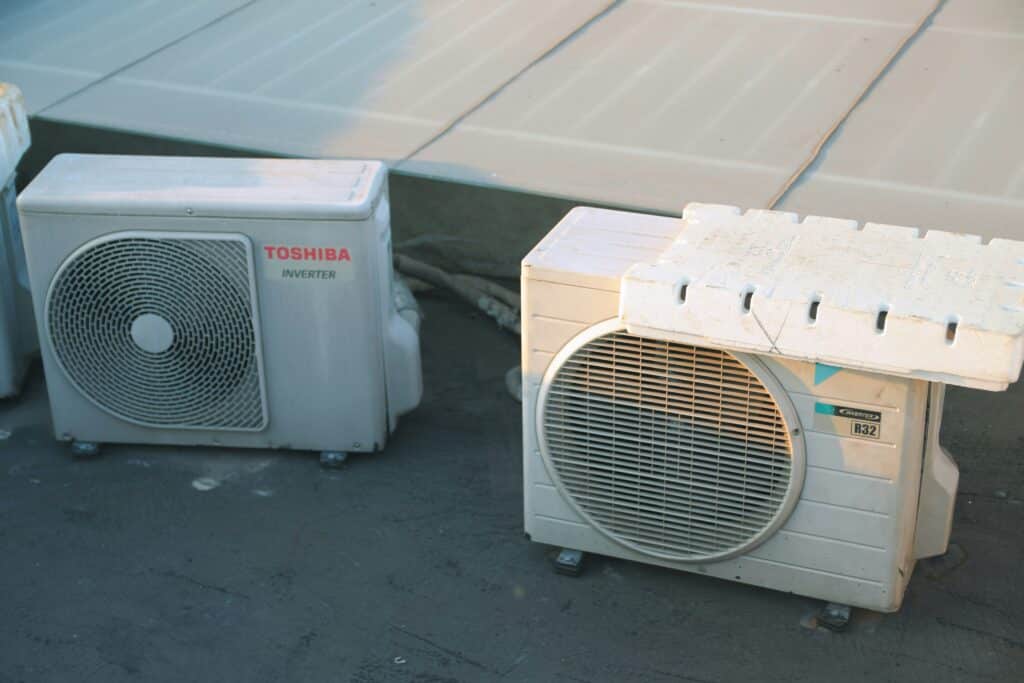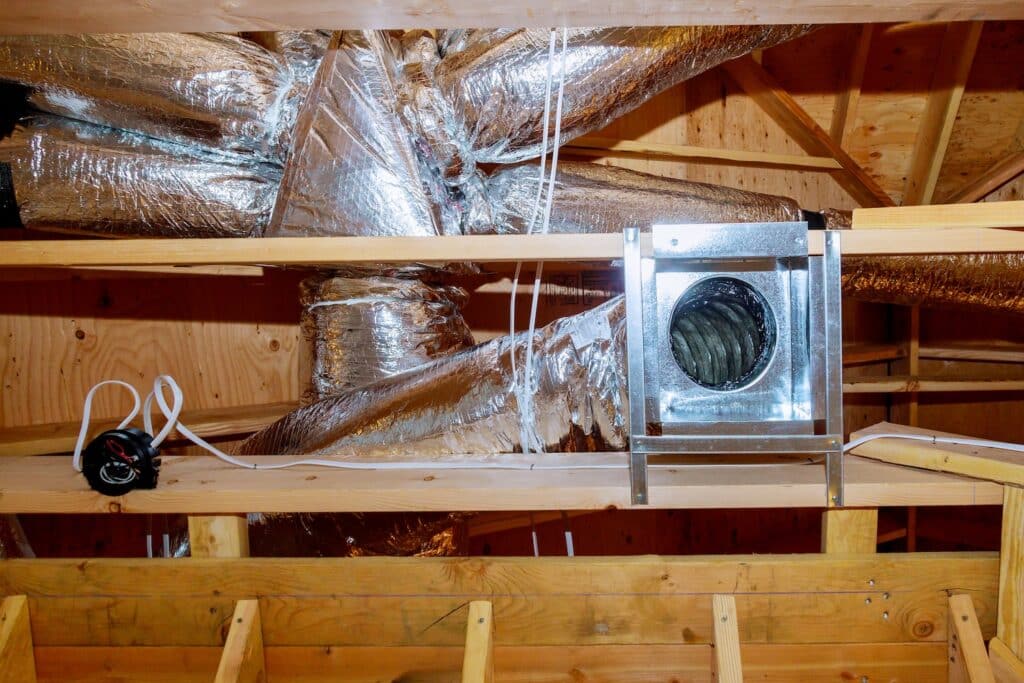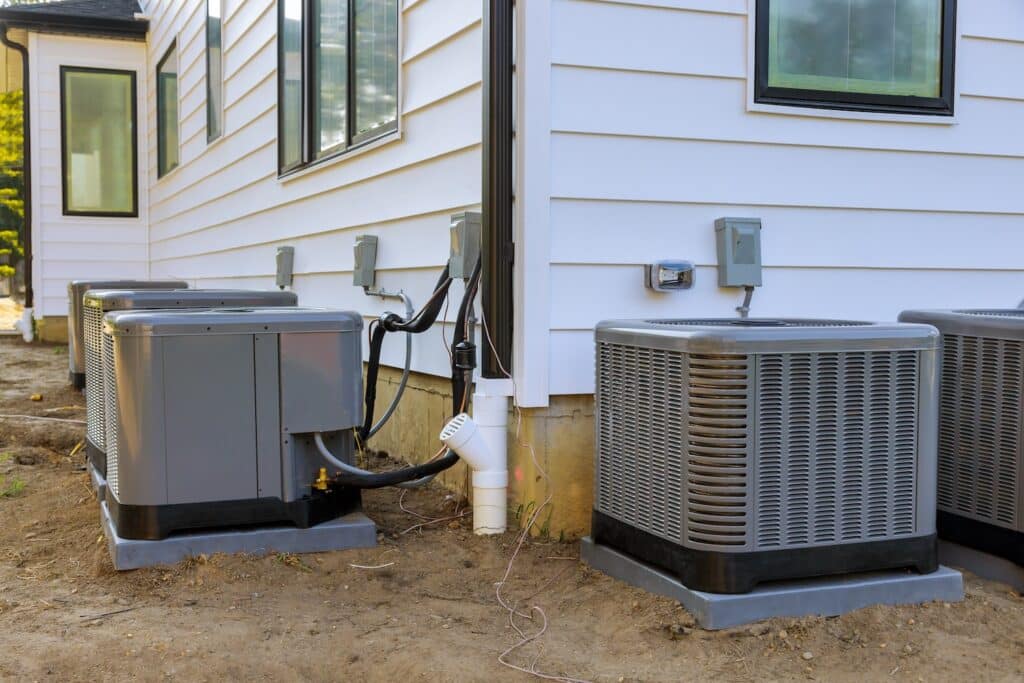Are you planning to replace your HVAC system and wondering about the cost involved? The average cost to replace an HVAC system ranges from $11,590 to $14,100 as of 2025. Understanding this can help you budget effectively and avoid surprises. This number can change based on factors like the size, location, and type of system you choose. It’s important to consider these elements to make a well-informed decision.
Choosing to replace your HVAC system is a decision that goes beyond just numbers. Other considerations include energy efficiency, potential savings on your utility bills, and comfort level at home. Many homeowners look at replacing their HVAC system as an investment in their home’s value and efficiency. This isn’t just about swapping out one unit for another; it’s about improving how your home feels and operates.
Costs can vary significantly depending on where you live. For example, installing a new HVAC system in areas like Frisco, Texas might differ from national averages. This variation is often due to labor costs, climate, and local demand. Understanding these differences can help you plan better and ensure you’re getting the best deal possible.
Understanding HVAC Replacement Costs
Replacing an HVAC system can be a significant investment. The costs depend on several factors like the size of the unit, the type of system, and your location. Prices range from $5,000 to $34,000, depending on various elements, such as the complexity of the installation and the type of HVAC system chosen.
Factors Influencing Costs:
- Size of the Unit: Larger homes require more powerful systems, which typically cost more. A bigger unit can efficiently heat or cool larger spaces but comes with higher initial costs.
- Type of System: Central air systems, heat pumps, and ductless mini-split systems are common choices. Each has different price points, with central systems often being the costliest.
- Installation Complexity: Extensive ductwork or challenging installations can increase labor costs significantly. Homes needing new ducts might face costs reaching the higher end of the spectrum.
- Location: HVAC replacement costs can vary depending on where you live. Prices in urban areas might be higher due to increased labor rates.
Quick Cost Breakdown:
- Individual Unit: Around $6,000
- Complete System with Ductwork: Up to $34,000
- Average Replacement Cost: About $11,590 to $14,100 based on a wide range of projects.
Consider getting quotes from multiple providers to ensure you’re getting a fair price. Checking multiple options helps in finding a system that suits both your needs and budget. It’s important to balance upfront costs against long-term energy savings.
Cost Factors for Replacing an AC Unit

Several key factors influence the cost to replace an AC unit. These include the size and capacity of the unit, the complexity of the installation process, and the brand and quality of the units chosen. Understanding these factors can help you plan effectively.
Unit Size and Capacity
The size and capacity of an AC unit significantly impact the new AC unit cost. Larger units, meant for bigger spaces, typically cost more. It’s important to choose a unit that matches the needs of your home to ensure efficiency. A smaller unit in a large space might struggle to cool effectively, leading to inefficiency and increased energy bills. Conversely, an oversized unit for a smaller space can lead to short cycling, reducing its lifespan and efficiency. Proper sizing often requires professional assessment to determine the right capacity to ensure optimal cooling without unnecessary costs.
Installation Complexity
The complexity of an installation can also affect how much a new AC unit costs. Simple installations might only involve replacing the old unit with a new one of similar size and capacity. However, more complex installations can include modifying ductwork, electrical systems, or making architectural changes to accommodate a larger or different type of system. These additional requirements increase labor costs and time. Understanding these potential complexities before installation can help manage expectations and budgets. If you anticipate a complicated installation, consult with professionals early to get accurate estimates.
Brand and Quality of the Units
The brand and quality of air conditioning units can greatly affect costs. High-end brands often offer advanced technology and higher efficiency ratings but come with a higher price tag. While budget-friendly options exist, they may not offer the same performance or longevity. Evaluating the reliability and efficiency of a unit alongside its price is crucial. Investing in a reputable brand might cost more upfront but can lead to savings in energy and maintenance over time. Prioritize brands known for durability and efficiency to balance the initial AC unit cost with long-term value.
Pricing for Different Types of HVAC Systems

When considering an HVAC system replacement, different types can have varying costs. Understanding these differences helps you make informed decisions without overlooking essential aspects such as installation fees and equipment size.
Central Air Conditioners
Central air conditioners are popular for whole-home cooling. The cost for these systems can range significantly. The price for a new central air conditioner typically falls between $3,000 and $7,000, depending on the unit size and efficiency rating. For instance, a 3-ton unit, which is suitable for a medium-sized home, generally costs about $3,300 to $4,000. Installation costs may add $1,200 to $2,000, so it’s important to factor this into your budget.
Energy efficiency is a key consideration with central air units. Systems with higher SEER (Seasonal Energy Efficiency Ratio) ratings may cost more upfront but save money on electricity bills over time. For efficiency, look for units with a SEER rating of 14 or higher. Keep in mind that older homes might require additional ductwork, influencing your overall expenditure.
Heat Pumps
Heat pumps provide both heating and cooling, making them versatile for many climates. Their cost ranges from $4,500 to $10,000, depending on the type and size. An important factor for heat pumps is whether you’ll need a standard air-source or a more expensive but efficient geothermal system.
You can expect a typical air-source heat pump for residential use to cost between $4,500 and $7,500. Installation expenses can add another $1,500 to $2,500. Geothermal systems, while higher in initial cost, offer significant energy savings over time. Although their price can exceed $20,000, tax credits and rebates may offset some costs.
Ductless Mini-Split Systems
Ductless mini-split systems are ideal for homes without ductwork or where zoned heating and cooling are needed. They are known for their flexibility and energy efficiency, although they can cost more initially. A single-zone system typically ranges from $2,000 to $8,000, which includes installation.
If you opt for a dual-zone system, expect to pay between $4,000 and $10,000. These systems are highly efficient, potentially lowering energy bills. Many homeowners appreciate them for providing customized comfort in different areas of their homes. Systems with higher energy ratings may have higher upfront costs but can offer significant savings over time.
Options for Air Conditioning Units
When considering a new air conditioner, there are several options to explore. Each type of unit comes with specific features, benefits, and costs. The choice often depends on your needs and budget.
Central Air Conditioners are popular for cooling entire homes. These systems use ducts to distribute air, offering consistent cooling. The new air conditioner cost for these units typically ranges from $5,500 to $16,000, including installation.
Ductless Mini-Split Systems are a great option if you don’t have existing ducts. They consist of an outdoor unit and one or more indoor units. The cost typically varies from $3,000 to $7,000, depending on the number of indoor units needed.
Window Units are an affordable option for single rooms. These are installed directly within a window and can cool small spaces effectively. Prices for these range from $150 to $800.
Portable Air Conditioners offer flexibility, as they can be moved between rooms. They’re ideal for temporary cooling solutions, costing between $250 and $700.
When selecting an option, consider energy efficiency. Models with a higher SEER (Seasonal Energy Efficiency Ratio) rating are typically more efficient, saving on energy bills over time.
Installation and Labor Costs

When you are replacing your HVAC system, it’s important to consider the costs of professional services and additional expenses required. These costs can greatly impact the total investment of your new HVAC system.
Professional Services
Hiring a skilled technician is vital for a successful HVAC installation. Labor costs can vary, typically ranging from $2,000 to $4,000. Factors influencing these costs include the complexity of the installation, geographic location, and the technician’s experience. A detailed cost breakdown can help you compare different service providers.
In addition to basic installation, professionals may offer customized services like system zoning or smart thermostat integration. These enhancements can improve comfort but may increase the overall installation costs. Always request detailed quotes from multiple providers to ensure you get the best service for your budget.
Additional Installation Expenses
Beyond labor, there are other expenses to consider when installing a new HVAC system. Ductwork modifications, electrical upgrades, and permits are common additional costs. These expenses can add $500 to $2,000 to your project, depending on your home’s requirements and local regulations.
Some installations might also require structural changes, especially in older homes, which can raise overall costs. It’s advisable to factor in these potential expenses early in your planning process. This can help you avoid surprises and stay within your budget for air conditioning replacement. Proper planning ensures a smoother installation and prolongs the life of your new system.
Cost-Saving Tips and Rebates
When planning to replace your HVAC system, it’s crucial to explore ways to cut costs. Utilizing tax credits and choosing energy-efficient systems can lead to significant savings.
Tax Credits and Rebates
You can lower the cost of replacing an HVAC system by taking advantage of tax credits and rebates. Federal and state programs often offer incentives for purchasing energy-efficient units. This can lower the cost to replace an HVAC system and save you money on the actual purchase.
Some states provide rebates for specific energy-efficient installations. In California, new rebates can help you reduce the cost by up to $8,000. Make sure to check for available programs in your area.
Always consult a tax professional to understand which credits apply to you. Inquiring with local utility companies can also reveal additional incentives they may offer.
Energy-Efficient Systems
Investing in energy-efficient systems can significantly decrease the cost of running your HVAC system. These units are designed to use less energy, reducing your monthly bills.
High-efficiency systems may cost more upfront, but they often qualify for rebates and incentives. A system rated by ENERGY STAR can save you up to 20 percent on heating and cooling costs. Check for manufacturer’s rebates which might lower the new HVAC system cost even further.
When considering how much a new HVAC system costs, also factor in these long-term savings. Over time, the energy savings and rebates can offset the higher initial cost. Always research and compare options to find the best unit for your needs.
Budgeting for HVAC System Replacement
When planning to replace your HVAC system, it’s important to understand the costs involved. Typically, the cost of replacing an HVAC system in 2025 can range from $5,000 to $11,000. This price includes a basic system change-out but can vary based on your system and location.
Factors Influencing Cost:
- Type of System: Basic systems can cost between $5,000 and $7,000.
- Mid-Range Systems: Offer better efficiency and may cost a bit more.
- Labor Costs: Generally range from $500 to $2,500.
New Air Conditioning Unit Costs:
Expect to spend about $2,000 to $5,000 for a new air conditioning unit. The cost is dependent on the size and efficiency of the unit needed.
Budgeting Tips:
- Get Multiple Quotes: Contact various service providers to find competitive prices.
- Check for Rebates: Some places offer rebates for energy-efficient systems.
- Plan for Unexpected Costs: Be prepared for any additional expenses that may arise during installation.
Additional Considerations:
- Warranty Coverage: See if a warranty can reduce your costs.
- Home Size and Needs: Larger homes may need more robust systems, increasing the cost.
Frequently Asked Questions
Understanding HVAC replacement involves knowing costs, when to replace, and whether to repair or replace. It’s also useful to know the basics about HVAC systems themselves. This section covers these important questions in a straightforward way.
What is the typical cost to replace HVAC system?
The cost to replace an HVAC system typically ranges from $11,590 to $14,100 based on options and project size. Factors such as system efficiency, size, and brand can cause variations. Larger or more efficient systems generally cost more HVAC replacement cost.
How often should HVAC be replaced?
Typically, you should consider replacing your HVAC system every 10 to 15 years. Lifespan depends on how well the system is maintained and the climate it’s used in. Regular maintenance can extend the life of the system. This schedule helps avoid breakdowns and increases energy efficiency.
What does HVAC mean?
HVAC stands for Heating, Ventilation, and Air Conditioning. These systems regulate indoor air temperature and quality. HVAC systems provide cooling and heating through various methods like air conditioners, heat pumps, and furnaces. They are essential for comfortable and healthy indoor environments.
Should I repair or replace my HVAC?
Deciding between repairing or replacing your HVAC depends on age, repair cost, and efficiency. If your system is over 10 years old or repairs cost more than half the price of a new system, replacement is usually more economical. New systems also offer improved energy efficiency and lower utility bills.
